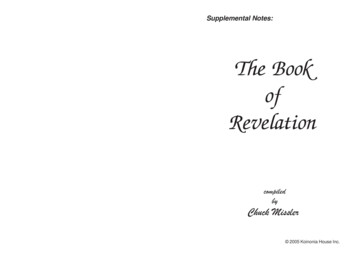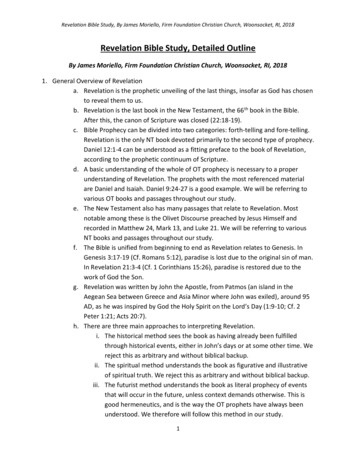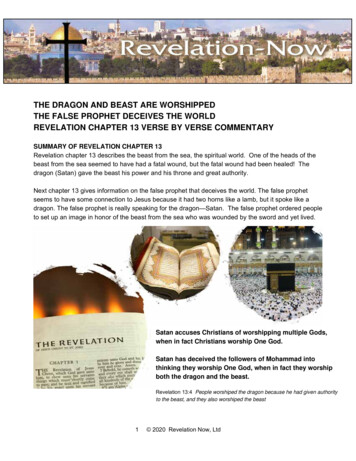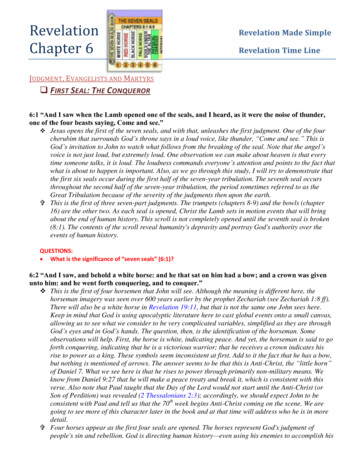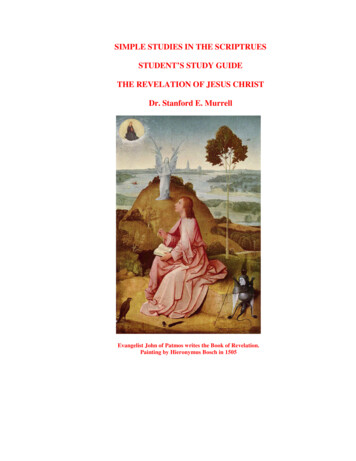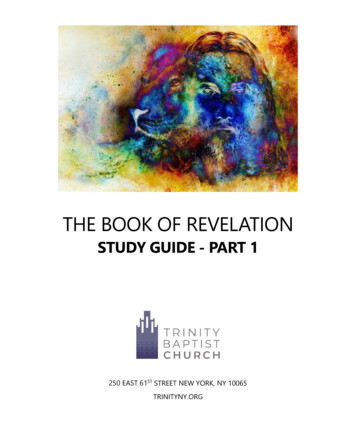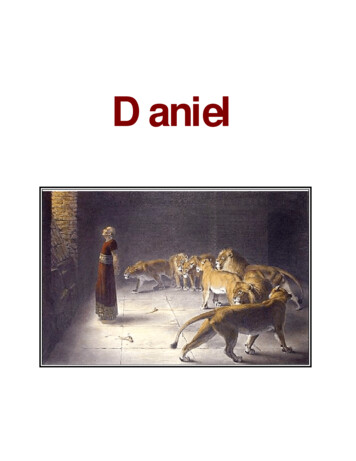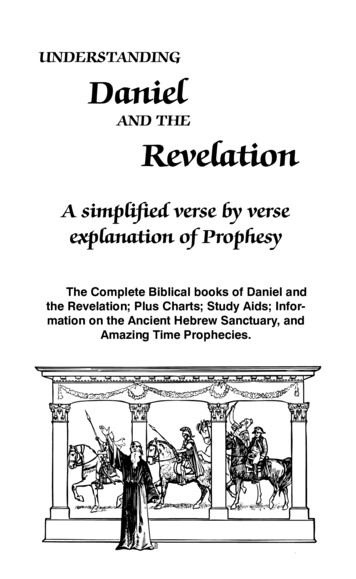
Transcription
Revelation Chapter 8 ‐ THE SEVEN TRUMPETSEncouragement for Christians ‐ Complement of Daniel's Prophecy ‐ Testimony of Standard Historians‐ Rome Divided ‐ The Western Empire Extinguished ‐ Alaric, Genseric, Attila, and TheodoricWe name as the subject of this chapter the seven trumpets, as these constitute the main theme ofthe chapter, although there are other matters introduced before the opening of that series ofevents. The first verse of this chapter relates to the events of the preceding chapters, and thereforeshould not have been separated from them by the division of the chapter. {1897 UrS, DAR 475.1} Revelation 8:1And when he had opened the seventh seal, there was silence in heaven about thespace of half an hour. {1897 UrS, DAR 475.2}The series of seven seals is here resumed and concluded. The sixth chapter closed with the events ofthe sixth seal, and the eighth commences with the opening of the seventh seal; hence the seventhchapter stands parenthetically between the sixth and seventh seals, from which it appears that thesealing work of that chapter belongs to the sixth seal. {1897 UrS, DAR 475.3}Silence in Heaven. ‐ Concerning the cause of this silence, only conjecture can be offered, ‐ aconjecture, however, which is supported by the events of the sixth seal. That seal does not bring usto the second advent, although it embraces events that transpire in close connection therewith. Itintroduces the fearful commotions of the elements, described as the rolling of the heavens togetheras a scroll, caused by the voice of God, the breaking up of the surface of the earth, and theconfession on the part of the wicked that the great day of God's wrath is come. They are doubtlessin momentary expectation of seeingthe King appear in, to them, unendurable glory. But the sealstops just short of that event. The personal appearing of Christ must therefore be allotted to thenext seal. But when the Lord appears, he comes with all the holy angels with him. Matt.25:31. Andwhen all the heavenly harpers leave the courts above to come down with their divine Lord, as hedescends to gather the fruit of his redeeming work, will there not be silence in heaven? {1897 UrS,DAR 475.4}The length of this period of silence, if we consider it prophetic time, would be about seven days.{1897 UrS, DAR 476.1} Revelation 8:2And I saw the seven angels which stood before God; and to them were given seventrumpets. {1897 UrS, DAR 476.2}This verse introduces a new and distinct series of events. In the seals we have had the history of thechurch during what is called the gospel dispensation. In the seven trumpets, now introduced, we269 P a g e
have the principal political and warlike events which were to transpire during the same time. {1897UrS, DAR 476.3} Revelation 8:3‐5And another angel came and stood at the altar, having a golden censer; andthere was given unto him much incense, that he should offer it with the prayers of all saints upon thegolden altar which was before the throne. 4. And the smoke of the incense, which came with theprayers of the saints, ascended up before God out of the angel's hand. 5. And the angel took thecenser, and filled it with fire of the altar, and cast it into the earth; and there were voices, andthunderings, and lightnings, and an earthquake. {1897 UrS, DAR 476.4}Having as it were, in verse 2, brought out the seven angels, and introduced them before us upon thestage of action, John, for a moment, in the three verses last quoted, directs attention to an entirelydifferent scene. The angel which approaches the altar is not one of the seven trumpet angels. Thealtar is the altar of incense, which, in the earthly sanctuary, was placed in the first apartment. Here,then, is another proof that there exists in heaven a sanctuary with its corresponding vessels ofservice, of which the earthly was a figure, and that we are taken into that sanctuary by the visions ofJohn, A work of ministration for all the saints in the sanctuary above is thus brought to view.Doubtless the entire work of mediation for the people of God during the gospel dispensation is herepresented. {1897 UrS, DAR 476.5}This is apparent from the fact that the angel offers his incense with the prayers of all saints. And thatwe are here carried forward to the end, is evident from the act of the angel in filling the censer withfire and casting it unto the earth; for his work is then done; no more prayers are to be offered upmingled with incense; and this symbolic act can have its application only at the time when theministration of Christ in the sanctuary in behalf of mankind has forever ceased. And following theangel's act are voices, thunderings, lightnings, and an earthquake ‐ exactly such occurrences as weare elsewhere informed transpire at the close of human probation. (See Rev.11:19; 16:17,18.) {1897UrS, DAR 477.1}But why are these verses thus thrown in here? Answer: As a message of hope and comfort for thechurch. The seven angels with their warlike trumpets had been introduced; terrible scenes were totranspire under their sounding; but before they commence, the people of God are pointed to thework of mediation in their behalf above, and their source of help and strength during this time.Though they should be tossed like feathers upon the tumultuous waves of strife and war, they wereto know that their great High Priest still ministered for them in the sanctuary in heaven, and thatthither they could direct their prayers, and have them offered, with incense, to their Father inheaven. Thus could they gain strength and support in all their calamities. {1897 UrS, DAR 477.2} Revelation 8:6And the seven angels which had the seven trumpets prepared themselves tosound. {1897 UrS, DAR 477.3}270 P a g e
The subject of the seven trumpets is here resumed, and occupies the remainder of this chapter andall of chapter 9. The seven angels prepare themselves to sound. Their sounding comes in as acomplement to the prophecy of Daniel 2 and 7, commencing with the breaking up of the old Romanempire into its ten divisions, of which, in the first four trumpets, we have a description. {1897 UrS,DAR 477.4} Revelation 8:7The first angel sounded, and there followed hail and fire mingled with blood, andthey were cast upon the earth: and the third part of trees was burnt up, and all green grass wasburnt up. {1897 UrS, DAR 477.5}Mr. Keith has very justly remarked on the subject of this prophecy:‐ {1897 UrS, DAR 478.1}"None could elucidate the texts more clearly, or expound them more fully, than the task has beenperformed by Gibbon. The chapters of the skeptical philosopher that treat directly of the matter,need but a text to be prefixed, and a few unholy words to be blotted out, to form a series ofexpository lectures on the eighth and ninth chapters of Revelation." "Little or nothing is left for theprofessed interpreter to do but to point to the pages of Gibbon." {1897 UrS, DAR 478.2}The first sore and heavy judgment which fell on Western Rome in its downward course, was the warwith the Goths under Alaric, who opened the way for later inroads. The death of Theodosius, theRoman emperor, occurred in January, 395, and before the end of the winter the Goths under Alaricwere in arms against the empire. {1897 UrS, DAR 478.3}The first invasion under Alaric ravaged Thrace, Macedonia, Attica, and the Peloponnesus, but did notreach the city of Rome. On his second invasion, however, the Gothic chieftain crossed the Alps andthe Apennines and appeared before the walls of the "eternal city," which soon fell a prey to the furyof the barbarians. {1897 UrS, DAR 478.4}"Hail and fire mingled with blood" were cast upon the earth. The terrible effects of this Gothicinvasion are represented as "hail," from the fact of the northern origin of the invaders; "fire," fromthe destruction by flame of both city and country; and "blood," from the terrible slaughter of thecitizens of the empire by the bold and intrepid warriors. {1897 UrS, DAR 478.5}The blast of the first trumpet has its location about the close of the fourth century and onward, andrefers to these desolating invasions of the Roman empire under the Goths. {1897 UrS, DAR 478.6}I know not how the history of the sounding of the first trumpet can be more impressively set forththan by presenting the graphic rehearsal of the facts which are stated in Gibbon's History, by Mr.Keith, in his Signs of the Times, Vol. I, pp. 221‐233:‐ {1897 UrS, DAR 478.7}"Large extracts show how amply and well Gibbon has expounded his text in the history of the firsttrumpet, the firststorm that pervaded the Roman earth, and the first fall of Rome. To use his wordsin more direct comment, we read thus the sum of the matter: 'The Gothic nation was in arms at thefirst sound of the trumpet, and in the uncommon severity of the winter, they rolled their ponderouswagons over the broad and icy back of the river. The fertile fields of Phocis and Boeotia were271 P a g e
crowded with a deluge of barbarians,; the males were massacred; the females and cattle of theflaming villages were driven away. The deep and bloody traces of the march of the Goths couldeasily be discovered after several years. The whole territory of Attica was blasted by the banefulpresence of Alaric. The most fortunate of the inhabitants of Corinth, Argos, and Sparta were savedby death from beholding the conflagration of their cities. In a season of such extreme heat that thebeds of the rivers were dry, Alaric invaded the dominion of the West. A secluded "old man ofVerona," the poet Claudian, pathetically lamented the fate of his contemporary trees. which mustblaze in the conflagration of the whole country [note the words of the prophecy, ‐ "The third part ofthe trees was burned up"]; and the emperor of the Romans fled before the king of the Goths.' {1897UrS, DAR 478.8}"A furious tempest was excited among the nations of Germany, from the northern extremity ofwhich the barbarians marched almost to the gates of Rome. They achieved the destruction of theWest. The dark cloud which was collected along the coasts of the Baltic, burst in thunder upon thebanks of the upper Danube. The pastures of Gaul, in which flocks and herds grazed, and the banks ofthe Rhine, which were covered with elegant houses and well‐cultivated farms, formed a scene ofpeace and plenty, which was suddenly changed into a desert, distinguished from the solitude ofnature only by smoking ruins. Many cities were cruelly oppressed, or destroyed. Many thousandswere inhumanly massacred; and the consuming flames of war spread over the greater part of theseventeen provinces of Gaul. {1897 UrS, DAR 479.1}"Alaric again stretched his ravages over Italy. During four years the Goths ravaged and reigned overit without control. And in the pillage and fire of Rome, the streets of thecity were filled with deadbodies; the flames consumed many public and private buildings; and the ruins of a palace remained(after a century and a half) a stately monument of the Gothic conflagration. {1897 UrS, DAR 479.2}"The concluding sentence of the thirty‐third chapter of Gibbon's History is of itself a clear andcomprehensive commentary; for in winding up his own description of this brief but most eventfulperiod, he concentrates, as in a parallel reading, the sum of the history and the substance of theprediction. But the words which precede it are not without their meaning: 'The public devotion ofthe age was impatient to exalt the saints and martyrs of the Catholic Church on the altars of Dianaand Hercules. The union of the Roman empire was dissolved; its genius was humbled in the dust;and armies of unknown barbarians, issuing from the frozen regions of the North, had establishedtheir victorious reign over the fairest provinces of Europe and Africa.' {1897 UrS, DAR 480.1}"The last word, Africa, is the signal for the sounding of the second trumpet. The scene changes fromthe shores of the Baltic to the southern coast of the Mediterranean, or from the frozen regions ofthe North to the borders of burning Africa; and instead of a storm of hail being cast upon the earth,a burning mountain was cast into the sea." {1897 UrS, DAR 480.2}"VERSE 8. And the second angel sounded, and as it were a great mountain burning with fire was castinto the sea: and the third part of the sea became blood; 9. And the third part of the creatures whichwere in the sea, and had life, died; and the third part of the ships were destroyed." {1897 UrS, DAR480.3}The Roman empire, after Constantine, was divided into three parts; and hence the frequent remark,"a third part of men," etc., in allusion to the third part of the empire which was under the scourge.272 P a g e
This division of the Roman kingdom was made at the death of Constantine, among his three sons,Constantius, Constantine II, and Constans. Constantius possessed the East, and fixed his residence atConstantinople, the metropolis of the empire. Constantine the Second held Britain, Gaul, and Spain.Constans held Illyricum, Africa, and Italy. (See Sabine's Ecclesiastical History, p. 155.) Of this well‐knownhistorical fact, Elliott, as quoted by Albert Barnes, in his notes on Rev.12:4, says: "Twice, atleast, before the Roman empire became divided permanently into the two parts, the Eastern and theWestern, there was a tripartite division of the empire. The first occurred in A.D. 311, when it wasdivided between Constantine, Licinius, and Maximin; the other, A.D. 337, on the death ofConstantine, Constans and Constantius." {1897 UrS, DAR 480.4}The history illustrative of the sounding of the second trumpet evidently relates to the invasion andconquest of Africa, and afterward of Italy, by the terrible Genseric. His conquests were for the mostpart NAVAL; and his triumphs were "as it were a great mountain burning with fire, cast into the sea."What figure would better, or even so well, illustrate the collision of navies, and the general havoc ofwar on the maritime coasts? In explaining this trumpet, we are to look for some events which willhave a particular bearing on the commercial world. The symbol used naturally leads us to look foragitation and commotion. Nothing but a fierce maritime warfare would fulfil the prediction. If thesounding of the first four trumpets relates to four remarkable events which contributed to thedownfall of the Roman empire, and the first trumpet refers to the ravages of the Goths under Alaric,in this we naturally look for the next succeeding act of invasion which shook the Roman power andconduced to its fall. The next great invasion was that of "the terrible Genseric," at the head of theVandals. His career occurred during the years A.D. 428‐468. This great Vandal chief had hisheadquarters in Africa. But as Gibbon states, "The discovery and conquest of the black nations [inAfrica], that might dwell beneath the torrid zone, could not tempt the rational ambition of Genseric;but he cast his eyes TOWARD THE SEA; he resolved to create a naval power, and his bold resolutionwas executed with steady and active perseverance." From the port of Carthage he repeatedly madepiratical sallies, and preyed on the Roman commerce, and waged war with that empire. To cope withthis sea monarch, the Roman emperor, Majorian, made extensive naval preparations. Threehundredlong galleys, with an adequate proportion of transports and smaller vessels, were collectedin the secure and capacious harbor of Cartagena, in Spain. But Genseric was saved from impendingand inevitable ruin by the treachery of some powerful subjects, envious or apprehensive of theirmaster's success. Guided by their secret intelligence, he surprised the unguarded fleet in the bay ofCartagena; many of the ships were sunk, taken, or burned, and the preparations of three years weredestroyed in a single day. {1897 UrS, DAR 481.1}Italy continued to be long afflicted by the incessant depredations of the Vandal pirates. In the springof each year they equipped a formidable navy in the port of Carthage, and Genseric himself, thoughat a very advanced age, still commanded in person the most important expeditions. {1897 UrS, DAR482.1}The Vandals repeatedly visited the coasts of Spain, Liguria, Tuscany, Campania, Lucania, Bruttium,Apulia, Calabria, Venetia, Damlatia, Epirus, Greece, and Sicily. {1897 UrS, DAR 482.2}The celerity of their motion enabled them, almost at the same time, to threaten and to attack themost distant objects which attracted their desires; and as they always embarked a sufficient number273 P a g e
of horses, they had no sooner landed then they swept the dismayed country with a body of lightcavalry. {1897 UrS, DAR 482.3}A last and desperate attempt to dispossess Genseric of the sovereignty of the seas, was made in theyear 468 by Leo, the emperor of the East. Gibbon bears witness to this as follows:‐ {1897 UrS, DAR482.4}"The whole expense of the African campaign amounted to the sum of one hundred and thirtythousand pounds of gold, ‐ about five million two hundred thousand pounds sterling. . . . The fleetthat sailed from Constantinople to Carthage consisted of eleven hundred and thirteen ships, and thenumber of soldiers and mariners exceeded one hundred thousand men. . . . The army of Heracliusand the fleet of Marcellinus either joined or seconded the imperial lieutenant. . . . The wind becamefavorable to the designs of Genseric. He manned his largest ships of war with the bravest of theMoors and Vandals, and they towed after them many large barks filled with combustible materials.In the obscurity of the night, thesedestructive vessels were impelled against the unguarded andunsuspecting fleet of the Romans, who were awakened by a sense of their instant danger. Theirclose and crowded order assisted the progress of the fire, which was communicated with rapid andirresistible violence; and the noise of the wind, the crackling of the flames, the dissonant cries of thesoldiers and mariners, who could neither command nor obey, increased the horror of the nocturnaltumult. While they labored to extricate themselves from the fire‐ships, and to save at least a part ofthe navy, the galleys of Genseric assaulted them with temperate and disciplined valor; and many ofthe Romans who escaped the fury of the flames, were destroyed or taken by the victorious Vandals. . . After the failure of this great expedition, Genseric again became the tyrant of the sea; the coastsof Italy, Greece, and Asia were again exposed to his revenge and avarice; Tripoli and Sardiniareturned to his obedience; he added Sicily to the number of his provinces; and before he died, in thefulness of years and of glory, he beheld the FINAL EXTINCTION of the empire of the West." ‐ Gibbon,Vol. III, pp. 495‐498. {1897 UrS, DAR 483.5}Concerning the important part which this bold corsair acted in the downfall of Rome, Mr. Gibbonuses this significant language: "Genseric, a name which, in the destruction of the Roman empire, hasdeserved an equal rank with the names of Alaric and Attila." {1897 UrS, DAR 484.1} Revelation 8:10‐11And the third angel sounded, and there fell a great star from heaven,burning as it were a lamp, and it fell upon the third part of the rivers, and upon the fountains ofwaters. 11. And the name of the star is called Wormwood: and the third part of the waters becamewormwood; and many men died of the waters, because they were made bitter. {1897 UrS, DAR484.2}In the interpretation and application of this passage, we are brought to the third important eventwhich resulted in the subversion of the Roman empire. And in finding a historical fulfilment of thisthird trumpet, we shall be indebted to the Notes of Dr. Albert Barnes for a few extracts. In explainingthis scripture, it is necessary, as this commentator says, ‐ {1897 UrS, DAR 484.3}274 P a g e
"That there should be some chieftain or warrior whomight be compared to a blazing meteor; whosecourse would be singularly brilliant; who would appear suddenly LIKE a blazing star, and thendisappear like a star whose light was quenched in the waters. That the desolating course of thismeteor would be mainly on those portions of the world which abounded with springs of water andrunning streams; that an effect would be produced as if those streams and fountains were madebitter; that is, that many persons would perish, and that wide desolations would be caused in thevicinity of those rivers and streams, as if a bitter and baleful star should fall into the waters, anddeath should spread over lands adjacent to them, and watered by them." ‐ Notes on Revelation 8.{1897 UrS, DAR 484.4}It is here premised that this trumpet has allusion to the desolating wars and furious invasions ofAttila against the Roman power, which he carried on at the head of his hordes of Huns. Speaking ofthis warrior, particularly of his personal appearance, Mr. Barnes says:‐ {1897 UrS, DAR 485.1}"In the manner of his appearance, he strongly resembled a brilliant meteor flashing in the sky. Hecame from the East gathering his Huns, and poured them down, as we shall see, with the rapidity ofa flashing meteor, suddenly on the empire. He regarded himself also as devoted to Mars, the god ofwar, and was accustomed to array himself in a peculiarly brilliant manner, so that his appearance, inthe language of his flatterers, was such as to dazzle the eyes of beholders." {1897 UrS, DAR 485.2}In speaking of the locality of the events predicted by this trumpet, Mr. Barnes has this note; {1897UrS, DAR 485.3}"It is said particularly that the effect would be on 'the rivers' and on 'the fountains of waters.' If thishas a literal application, or if, as was supposed in the case of the second trumpet, the language usedwas such as had reference to the portion of the empire that would be particularly affected by thehostile invasion, then we may suppose that this refers to those portions of the empire thatabounded in rivers and streams and more particularly those in which the rivers and streams hadtheir origin; for the effect was permanently in the 'fountains of waters.' As a matter of fact, theprincipal operations of Attila were on the regions of the Alps, and on the portions of the empirewhence the rivers flow down into Italy. The invasion of Attila is described by Mr. Gibbon in thisgeneral language: 'The whole breadth of Europe, as it extends above five hundred miles from theEuxine to the Adriatic, was at once invaded, and occupied, and desolated, by the myriads ofbarbarians whom Attila led into the field.'" {1897 UrS, DAR 485.4}"And the Name of the Star is Called Wormwood [denoting the bitter consequences]." These words ‐which are more intimately connected with the preceding verse, as even the punctuation in ourversion denotes ‐ recall us for a moment to the character of Attila, to the misery of which he was theauthor or the instrument, and to the terror that was inspired by his name. {1897 UrS, DAR 487.1}"'Total extirpation and erasure,' are terms which best denote the calamities he inflicted." He styledhimself, "The Scourge of God." {1897 UrS, DAR 487.2}"One of his lieutenants chastised and almost exterminated the Burgundians of the Rhine. Theytraversed, both in their march and in their return, the territories of the Franks; and they massacredtheir hostages as well as their captives. Two hundred young maidens were tortured with exquisiteand unrelenting rage; their bodies were torn asunder by wild horses, or were crushed under the275 P a g e
weight of rolling wagons; and their unburied limbs were abandoned on public roads, as a prey todogs and vultures. {1897 UrS, DAR 487.3}"It was the boast of Attila that the grass never grew on the spot which his horse had trod. TheWestern emperor with the senate and people of Rome, humbly and fearfully deprecated the wrathof Attila. And the concluding paragraph of the chapters which record his history, is entitled,'Symptoms of the Decay and Ruin of the Roman Government.' 'The name of the star is calledWormwood.'" ‐ Keith. {1897 UrS, DAR 487.4} Revelation 8:12And the fourth angel wounded, and the third part of the sun was smitten, andthe third part of the moon, and the third part of the stars; so as the third part of them was darkened,and the day shone not for a third part of it, and the night likewise. {1897 UrS, DAR 487.5}We understand that this trumpet symbolizes the career of Odoacer, the barbarian monarch who wasso intimately connectedwith the downfall of Western Rome. The symbols sun, moon, and stars ‐ forthey are undoubtedly here used as symbols ‐ evidently denote the great luminaries of the Romangovernment, ‐ its emperors, senators, and consuls. Bishop Newton remarks that the last emperor ofWestern Rome was Romulus, who in derision was called Augustulus, or the "diminutive Augustus."Western Rome fell A.D. 476. Still, however, though the Roman sun was extinguished, its subordinateluminaries shone faintly while the senate and consuls continued. But after many civil reverses andchanges of political fortune, at length, A.D. 566, the whole form of the ancient government wassubverted, and Rome itself was reduced form being the empress of the world to a poor dukedomtributary to the Exarch of Ravenna. {1897 UrS, DAR 487.6}Under the heading, "Extinction of the Western Empire, A.D. 476 or A.D. 479," Elder J. Litch(Prophetic Expositon, Vol. II, pp. 156‐160) quotes from Mr. Keith as follows:‐ {1897 UrS, DAR 488.1}"The unfortunate Augustulus was made the instrument of his own disgrace; and he signified hisresignation to the senate; and that assembly, in their last act of obedience to a Roman prince, stillaffected the spirit of freedom and the forms of the constitution. An epistle was addressed, by theirunanimous decree, to the emperor Zeno, the son‐in‐law and successor of Leo, who had lately beenrestored, after a short rebellion, to the Byzantine throne. They solemnly 'disclaim the necessity oreven the wish of continuing any longer the imperial succession in Italy; since in their opinion themajesty of a sole monarch is sufficient to pervade and to protect, at the same time, both the Eastand the West. In their own name, and in the name of the people, they consent that the seat ofuniversal empire shall be transferred from Rome to Constantinople; and they basely renounce theright of choosing their master, the only vestige which yet remained of the authority which had givenlaws to the world.' {1897 UrS, DAR 488.2}"The power and glory of Rome as bearing rule over any nation, became extinct. The name aloneremained to the queen of nations. Every token of royalty disappeared from the imperial city. Shewho had ruled over the nations sat in thedust, like a second Babylon, and there was no thronewhere the Caesars had reigned. The last act of obedience to a Roman prince which that once august276 P a g e
assembly performed, was the acceptance of the resignation of the last emperor of the West, and theabolition of the imperial succession in Italy. The sun of Rome was smitten. . . . {1897 UrS, DAR 488.3}"A new conqueror of Italy, Theodoric, the Ostrogoth, speedily arose, who unscrupulously assumedthe purple and reigned by right of conquest. 'The royalty of Theodoric was proclaimed by the Goths(March 5, A.D. 493), with the tardy, reluctant, ambiguous consent of the emperor of the East.' Theimperial Roman power, of which either Rome or Constantinople had been jointly or singly the seat,whether in the West or the East, was no longer recognized in Italy, and the third part of the sun wassmitten, till it emitted no longer the faintest rays. The power of the Caesars was unknown in Italy;and a Gothic king reigned over Rome. {1897 UrS, DAR 489.1}"But though the third part of the sun was smitten, and the Roman imperial power was at an end inthe city of the Caesars, yet the moon and the stars still shone, or glimmered, for a little longer in theWestern empire, even in the midst of Gothic darkness. The consulship and the senate ["the moonand the stars"] were not abolished by Theodoric. 'A Gothic historian applauds the consulship ofTheodoric as the height of all temporal power and greatness;' ‐ as the moon reigns by night after thesetting of the sun. And instead of abolishing that office, Theodoric himself 'congratulates thoseannual favorites of fortune, who, without the cares, enjoyed the splendor of the throne.' {1897 UrS,DAR 489.2}"But in their prophetic order, the consulship and the senate of Rome met their fate, though they fallnot by the hands of Vandals or of Goths. The next revolution in Italy was in subjection to Belisarius,the general of Justinian, emperor of the East. He did not spare what barbarians had hallowed. 'TheRoman Consulship Extinguished by Justinian, A.D. 541,' is the title of the last paragraph of thefortieth chapter of Gibbon's History of the Decline and Fall of Rome. 'The succession of the consulsfinally ceased in the thirteenth yearof Justinian, whose despotic temper might be gratified by thesilent extinction of a title which admonished the Romans of their ancient freedom.' The third part ofthe sun was smitten, and the third part of the moon, and the third part of the stars. In the politicalfirmament of the ancient world, while under the reign of imperial Rome, the emperorship, theconsulate, and the senate shone like the sun, the moon, and the stars. The history of their declineand fall is brought down till the two former were 'extinguished,' in reference to Rome and Italy,which so long had ranked as the first of cities and of countries; and finally, as the fourth trumpetcloses, we see the 'extinction of that illustrious assembly,' the Roman senate. The city that had ruledthe world, as if in mockery of human greatness, was conquered by the eunuch Narses, the successorof Belisarius. He defeated the Goths (A.D. 552), achieved 'the conquest of Rome,' and the fate of thesenate was sealed." {1897 UrS, DAR 489.3}Elliott (Horae Apocalypticae, Vol. I, pp. 357‐360) speaks of
270 Page have the principal political and warlike events which were to transpire during the same time. {1897 UrS, DAR 476.3}


